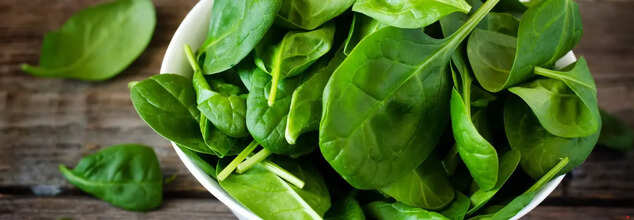- Health Conditions A-Z
- Health & Wellness
- Nutrition
- Fitness
- Health News
- Ayurveda
- Videos
- Medicine A-Z
- Parenting
- Web Stories

Credit: Canva
Can Munching On Raw Spinach Curb Snacking?
A new TikTok trend has people stuffing raw spinach leaves into their mouths and eating them in large quantities, with some users claiming that consuming spinach first thing in the morning can curb cravings for salty and sugary foods throughout the day. While spinach is undeniably nutritious and may help manage hunger, health experts caution that there is no scientific proof supporting that eating this vegetable can retrain taste buds.
Spinach is rich in vitamins, minerals and antioxidants. It also provides fiber, which may promote satiety and reduce between-meal cravings. Moreover, there is empirical evidence that eating vegetables and proteins before carbohydrates—a practice known as meal sequencing—can help lower blood sugar spikes, which may, in turn, reduce sugar and carb cravings. One recent review of 11 studies found that individuals who ate carbohydrates at the end of their meals had lower blood sugar levels.
No Scientific Evidence To Support Spinach Health Benefits
However, despite its many benefits, there is no scientific evidence to show that spinach retains taste buds. Still, the trend has encouraged people to eat more spinach, which health experts say is a good practice. That said, consuming spinach in excess isn’t without risk. Although there is no official consensus on how much is too much, the U.S. Department of Agriculture defines a serving as 2 cups of raw spinach or 1 cup of cooked spinach.
Spinach contains high levels of vitamin K, which may interfere with certain blood-thinning medications. It’s also rich in oxalates—compounds that can bind to calcium and potentially worsen kidney stones in susceptible individuals. Cooking spinach can help reduce its oxalate content.
Raw Spinach Is Superfood Packed With Vit-C
In terms of nutritional value, raw spinach offers more lutein and vitamin C, while cooking increases the bioavailability of nutrients like vitamin A, beta carotene, thiamin, riboflavin, magnesium, and calcium. Nutrient content can also vary depending on soil quality, storage duration, cooking method, and time, said registered dietitian Theresa Gentile, spokeswoman for the Academy of Nutrition and Dietetics.
If you’re not a fan of spinach, there's no need to force it down, experts noted. Gentile suggests trying baby spinach, which has a milder, sweeter taste. Alternatively, other dark leafy greens like kale, arugula, cabbage, collard greens, escarole, mustard greens, romaine, Swiss chard, turnip greens, and watercress can be just as nutritious.
Adding spinach or other greens to breakfast or blending them into smoothies is a great start, but one mouthful won’t meet the daily recommended intake of 2 to 4 cups. Experts recommend incorporating a variety of vegetables, including colorful peppers and cruciferous options like broccoli, cauliflower, and brussel sprouts.

Coffee Can Reduce The Risk of Diabetes If You Make This One Change
Coffee is one of the most popular drinks in the world. On an average an American drinks about 240 milliliter of coffee in a day and a cup of it generally has about 120-180 milligrams of caffeine. The relationship between caffeine intake and people with diabetes has always been up for debate. According to Mayo clinic, caffeine can affect the way your body uses insulin, which could lead to higher or lower blood sugar. While some experts say that it is safe for them to drink coffee in moderation, it depends on each person differently.
If you are a regular coffee drinker, and do not know how to get rid of the habit, this suggestion by Diabetes UK may be of use to you. As there is a common belief that the risk of a person developing type 2 diabetes is based on what kind of diet and lifestyle they follow. When you are at risk of it, you have to make some necessary changes in order to lead a relatively healthy life.
Diabetes UK suggests a surprising switch: choose tea or coffee instead of fruit juice. If you can drink these hot drinks without adding extra sugar, it could be a simple way to reduce your risk of type 2 diabetes.
How Is Coffee Better For Type 2 Diabetes Than Fruit Juice
People with type 2 diabetes have to avoid many things including foods that are perceived to be healthy but tend to have lot of natural sugar. Fruit juices might seem healthy compared to coffee, but many popular brands have a lot of added sugar. Even juices made only from fruit can still have a lot of natural sugars. Experts on diabetes say it's better to eat whole fruits like apples, grapes, and berries instead of drinking their juice. Whole fruits have fiber, which helps your body absorb sugar slowly and stops the quick sugar rushes you get from juice.
We know that fizzy drinks and energy drinks with lots of sugar are linked to problems like type 2 diabetes. Giving up caffeine from these drinks can be hard. If plain tea or coffee doesn't appeal to you, try versions with fewer calories or no added sugar. This can help satisfy your cravings without increasing your diabetes risk. Diabetes UK also points out that even losing a small amount of weight, like 1kg, can help lower your risk.
Important Point To Keep In Mind
It's important to remember that some things that increase your risk of type 2 diabetes are out of your control. Diabetes UK explains that people with African Caribbean, Black African, or South Asian family backgrounds, as well as those who have family members with type 2 diabetes, tend to have a higher chance of developing the condition.
How you make your coffee can also be a game changer. A study in the European Journal of Preventive Cardiology found that filtering coffee, like with a paper filter, is better for your health than just boiling the ground and drinking the water. This was especially true for older adults.
However, the Harvard Health Publishing states that “the study is observational and doesn't prove that filtered coffee is healthier than unfiltered coffee, but it makes sense.”. However, it makes sense because unfiltered coffee has things called diterpenes that can raise your cholesterol.

(Credit-Canva)
This Anti-Inflammatory Spice Could Lower Your Cholesterol Levels
Spices have been a big part of many Asian cuisines for centuries. Not just as foods, but they were also used for their medicinal purposes. Spices like turmeric were often used to make medicinal concoction and other spices like cinnamon, ginger and peppermint are used for their anti-inflammatory qualities.
A new study has revealed that the compound that is responsible for the spiciness in chili pepper not only has anti-inflammatory properties but also has cholesterol lowering potential. Capsaicin, that makes chili peppers spicy has been studied for many years, researchers have found different nuisances of it that make it healthy for consumption.
Beyond its fiery nature, capsaicin exhibits cholesterol-lowering properties and may even play a role in reducing the risk of cancer and arthritis. A 2022 study published in Frontiers in Nutrition investigated capsaicin's impact on cholesterol in individuals with metabolic syndrome.
How Does Capsaicin Lower Cholesterol?
A 2022 publication in Frontiers in Nutrition reviewed nine controlled trials encompassing 461 patients with metabolic syndrome, a cluster of conditions that elevate the risk of type 2 diabetes and heart problems. The study found that when these people ate capsaicin, their total cholesterol and the "bad" kind of cholesterol went down a lot.
Other research suggests that eating chilies might be good for our hearts. A study from 2019 looked at what over 22,000 people in Italy ate and their health over about eight years. The study found that people who ate chili peppers more than four times a week were less likely to die from heart problems. This seemed to be true even if they didn't eat a super healthy diet. So, it looks like chilies might have a special way of helping our hearts.
Spicy Foods For Heart Health
While there are studies that show its benefits for heart health, there has been a lot of debate regarding the same. In a study published in the Molecular nutrition and food research 2022 researchers investigated the role of capsaicin for your heart health. The study revealed that it’s not clear yet how eating spicy food and chili peppers affects health.
There might be a link to better metabolism, less death, and fewer heart problems. How much capsaicin someone eats might also change the risk of stomach cancer in a complex way. Usually, it's safe to eat spicy foods and chili peppers. Another study published in the Biomolecules 2022 journal found that people who eat chili peppers often seem to be healthier and live longer. Studies in animals suggest that capsaicin, the hot part of chili peppers, might help prevent metabolic syndrome. It found that while eating a lot of chili peppers is linked to a lower chance of dying from heart problems, capsaicin doesn't clearly change blood sugar or fat levels.

Credit: Canva
Should You Swap Orange Carrot Juice With Black?
Heart disease and cancer continue to dominate as the leading causes of death in the United States, accounting for nearly 40% of all adult fatalities, according to recent data from the Centers for Disease Control and Prevention (CDC). In light of these alarming statistics, preventive nutrition strategies are more relevant than ever. One such promising solution may lie in a lesser-known superfood: black carrot juice.
While orange carrot juice has long been a staple in many health-conscious diets, black carrot juice may offer even greater protective benefits. Rich in anthocyanins—the pigments that give black carrots their distinctive deep purple hue—this juice serves as a potent source of natural antioxidants. These anthocyanins have been shown to reduce hypertension, fight inflammation, and protect arteries by decreasing plaque buildup. In fact, a 2024 review published in Applied Food Research emphasized the role of anthocyanins and polyphenols in combatting chronic diseases, even suggesting they may inhibit the growth of cancerous cells.
Dietitians often compare these bioactive compounds to “attentive gardeners,” constantly working to prune away harmful cellular byproducts while supporting overall health. When combined with other natural elements found in black carrots—such as carotenoids and polyphenols—the juice becomes a powerful blend capable of neutralizing free radicals, delaying cellular aging, and potentially preventing tumor formation.
Upgrade In Everyday Nutrition
Swapping your usual orange carrot juice for black carrot juice could therefore provide a significant upgrade to your daily nutrition. But experts note that consuming raw or lightly cooked black carrots may be even more beneficial than juicing. According to a 2021 study published in Foods, storing black carrots in dark, moderately cool environments helps preserve their full nutritional content. The study, which simulated human digestion, found that the antioxidant activity and nutrient bioaccessibility of raw black carrots remained impressively high, reinforcing the idea that whole foods often offer more than their juiced counterparts.
Further research backs this up. A study titled Anthocyanin Extraction from Black Carrot: Health Promoting Properties and Potential Applications, published in the Journal of Agriculture and Food Research, highlights black carrots as a rich source of anthocyanins with broad therapeutic potential. Researchers noted these flavonoids not only add natural color to foods but also offer a range of biological benefits, including reducing the risk of cardiovascular disease, inflammation, and certain cancers.
Despite their nutritional value, black carrots face some limitations in wider food industry use due to challenges like seasonal availability and the degradation of anthocyanins when processed with heat. However, the adoption of modern, heat-free extraction methods could help overcome these barriers and expand their applications in functional foods.
In short, making the switch from orange to black carrot juice may do more than diversify your palette—it could be a proactive step toward long-term health. Whether enjoyed as a juice or eaten whole, black carrots offer a rare blend of taste, color, and therapeutic potential that makes them worthy of a spot in your diet.
© 2024 Bennett, Coleman & Company Limited

